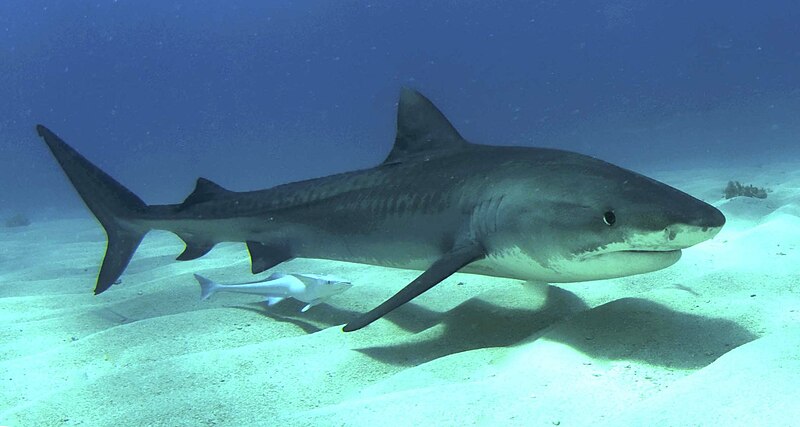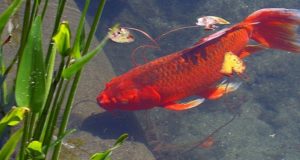 Hello, Cory here. Almost every day you can find some piece of news involving sharks, and in many cases, the news is another instance of someone, somewhere discovering mutilated shark carcasses or that a commercial fishing boat has been found throwing finless carcasses overboard. Just the idea of shark finning is terrible, I’m not sure how anyone can support and/or participate in the shark fin trade. Shark finning has been banned in many countries such as the US, but remains a problem in European and Asian countries. Despite the concern over shark populations and environmental impacts, shark finning continues, even growing from year to year in popularity, all to cater to a taste for an expensive bowl of soup.
Hello, Cory here. Almost every day you can find some piece of news involving sharks, and in many cases, the news is another instance of someone, somewhere discovering mutilated shark carcasses or that a commercial fishing boat has been found throwing finless carcasses overboard. Just the idea of shark finning is terrible, I’m not sure how anyone can support and/or participate in the shark fin trade. Shark finning has been banned in many countries such as the US, but remains a problem in European and Asian countries. Despite the concern over shark populations and environmental impacts, shark finning continues, even growing from year to year in popularity, all to cater to a taste for an expensive bowl of soup.
The preferred shark species for fins are Tiger, Mako, Sawfish, Sandbar, Bull, Hammerhead, Blacktip, Porbeagle, Blue and Thresher sharks, though other species are also targeted, including sawfishes and shark-like rays. Sharks are caught by long lines, gill nets, and other means of fishing. They are then brought aboard the vessel, the fins are cut off and the shark is thrown back into the ocean. The shark remains alive through the whole process, and remains alive until it sinks to the bottom of the ocean or is eaten by other fish. There is no humane way to look at it, it is an unenvironmental, senseless, waste of an aquatic creature. The fin weight can be up to 5% of the sharks total body weight, leaving 95% wasted and dumped back into the ocean. Each vessel can collect as many as a 1000 or more fins per trip. Since shark fins are in high demand and can bring more than 100 per kilo of dried fins, the more they can catch, the more they make. To save on cargo space, the fins are  saved and the rest of the shark is thrown back because it brings a lot less revenue. So all in all, it comes down to money. It is estimated that nearly 73 million sharks are killed every year.
saved and the rest of the shark is thrown back because it brings a lot less revenue. So all in all, it comes down to money. It is estimated that nearly 73 million sharks are killed every year.
At the rate of 73 million sharks per year, the shark population is decreasing, reaching a point of no return. Sharks are vulnerable to overfishing because they grow slowly and live long lives. Generally low reproductive rates mean their populations are slow to recover. This is one of many compelling reasons why shark finning needs to be stopped now, before it is too late. Currently, there are 175 countries meeting in Doha, Qatar for the Convention on International Trade in Endangered Species (CITES). Amongst aquarium related topics, the convention is debating on adding eight shark species to the CITES Appendix II, requiring export permits for the species. From this, hopefully more manageable and sustainable practices may be derived.
 The environmental impacts are huge when it comes to sharks, as they are a top predator. When you remove the top predator, the ecosystem becomes chaotic. No one knows what would happen if sharks began to disappear to the point of extinction, but ultimately, the results would most certainly have a negative effect on other fish populations. Even the aquarium trade would be effected. The smaller, common fish that we buy everyday may decline because their predators (normally kept in check by becoming a meal for sharks) may have a population boom. It’s just an example of the domino effect in an ecosystem that could occur. Despite their bad reputation as aggressive killing machines, sharks are very important and not as menacing as many portray them to be. They help keep our oceans in balance and clean – without them, the oceans would never be the same. No matter how tasty shark fin soup may taste, it is not worth the massive impending concequences.
The environmental impacts are huge when it comes to sharks, as they are a top predator. When you remove the top predator, the ecosystem becomes chaotic. No one knows what would happen if sharks began to disappear to the point of extinction, but ultimately, the results would most certainly have a negative effect on other fish populations. Even the aquarium trade would be effected. The smaller, common fish that we buy everyday may decline because their predators (normally kept in check by becoming a meal for sharks) may have a population boom. It’s just an example of the domino effect in an ecosystem that could occur. Despite their bad reputation as aggressive killing machines, sharks are very important and not as menacing as many portray them to be. They help keep our oceans in balance and clean – without them, the oceans would never be the same. No matter how tasty shark fin soup may taste, it is not worth the massive impending concequences.
Shark Fin Soup image referenced from wikipedia and originally posted by Arthur Hungry
Juvenile Tiger Shark image referenced from wikipedia and originally posted by Albert kok
 That Fish Blog – Aquarium Advice and Information
That Fish Blog – Aquarium Advice and Information

